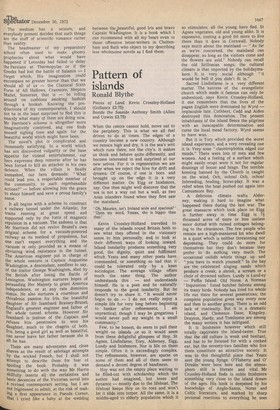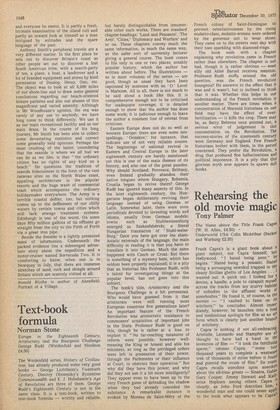Pattern of islands
Ronald Blythe
Pieces of Land. Kevin Crossley-Holland (Gollancz £3.75) Beside the Seaside Anthony Smith (Allen and Unwin £3.75) When the centre cannot hold, move out to the periphery. This is what we all feel driven to do at times. The edges of a country become a new country. Although we remain high and dry, it is the sea's writ which runs there, not the city's. It makes us think and behave quite differently, and become interested in and surprised at our new selves. For it is regeneration we are after when we reject the hive for drift and dreams. Of course, if one is born and brought up on the edge it is a very different matter. On Eigg or Inishmore, say. One then might well discover that the sea is not a way out but a wall, as two Aran islanders found when they first saw the mainland.
'Oh, Maurice, isn't Ireland wide and spacious?' Upon my word, Tomas, she is bigger than that.'
Kevin Crossley-Holland travelled to many of the islands round Britain both to see what they offered in the visionary sense to him personally, and to look at their different ways of looking inward. Island insularity produces something very good, the dignity, quiet and fulfilment which Yeats and many other poets have commended, or something so bad that it could be tolerated only by a keen sociologist. The average village offers much the same thing. The author understands this — and understands himself. He is a poet and he naturally responds to the good insularity. But he doesn't try to share it. "It would never begin to do — I do not really enjoy a simple life for very long before beginning to hanker after refinements; I am unpractical; though I may be gregarious I would never pull my weight in a small community."
Few, to be honest, do seem to pull their weight on islands ,or so it would seem from these delightful glimpses of Hoy, St Agnes, Lindisfarne, Tory, Alderney, Eigg, Lundy and Inishmore. Nor is life on them simple. Often it is exceedingly complex. The refinements, however, are sparse on some of them and all of them seem to demand a decent degree of handiness.
Hoy was not the empty place waiting to be filled-out with scholarship which the author had imagined, but tense and dynamic — mostly due to the lifeboat. The lifeboat keeps Hoy on its toes and won't let it slide into torpor. All the same, it is a middle-aged to elderly population which it so stimulates; all the young have fled. St Agnes vegetates, old and young alike. It is expensive, costing a good bit more to live there than it does in Cornwall. Nobody says much about the mainland — "As far as we're concerned, the mainland can disappear, so long as the visitors come and the flowers are sold." Nobody can recall the old Scillonian songs; the cultural climate is that imported by the holidaymakers. It is very social although "it would be hell if you didn't fit in."
Sacred Lindisfarne is a very different matter. The success of the evangelistic church which made it famous can only be understood, says Kevin Crossley-Holland, it one remembers that the lives of the pagan English were dominated by Wyrd — implacable fate. Cuthbert, Cedd anti Aiden destroyed this domination. The present inhabitants of the island fleece the pilgrims with an inescapable determination and curse the local mead factory. Wyrd seems to have won.
But it is Tory which provided the worst island experience, and a very revealing one it is. Very soon "claustrophobia edged our minds." There were lots of men and few women. And a feeling of a surface which might easily erupt were it not for regular dousings of booze and bingo. The terrible keening banned by the Church is caught on the wind, Och, ochon! Och, ochon! Inbreeding, feuding, horse-play. It was a relief when the boat pushed out again into Camusmore Bay.
A delicious climate wafts Alderney, making it hard to imagine what happened there during the last war. The great massacre which took place on Eigg is further away in time. Eigg is 7i thousand acres of more or less useless moor dotted with ruined cottages belonging to the clearances. The few people who remain are a high-mannered lot who dwell in a quiet which is neither threatening nor depressing. They could do more for themselves but they don't because they prefer to do nothing very much. The occasional ceilidh whirls things up and "you have to watch yourself." In the bay are the celebrated singing sands which produce a creak, a shriek, a scream or a choir of drowned sailors. Lundy is Lund-ey — Puffin Island. Old Norse. A Norman 'Inquisition' listed butcher falcons among its many birds. Nobody has lived his whole life out there for several generations; the complete population gives way every now and then to another group. There is an odd lack of continuity. But it is a dramatic island, and Clemence Dane, Kingsley, Drayton, Hardy, and Tomlinson are among the many writers it has intrigued.
It is Inishmore however which still totally captivates the island-taster. True that the old culture is weak and hesitant, and has to be listened for with a cocked ear, but the seventy-two families who live there constitute an attractive society. It was to this thoughtful place that Yeats sent the young Synge. O'Flaherty and 0' Diredin were born here and the atmos phere still is literate and vital. Mr Crossley-Holland finds in noble Inishmore something very close to the island dream of the ages. His book is deepened by his knowledge of Anglo-Saxon, Norse and Celtic literature, and marked by sharp personal reactions to everything he sees and everyone he meets. It is partly a fresh, intimate examination of the island cult and partly an inward look at himself as a man intrigued by solitudes and the spare language of the past.
Anthony Smith's peripheral travels are a very different matter. In the first place he sets out to discover Britain's coast as other people set out to discover a lost South American tribe, with a search-party of ten, a plane, a boat, a landrover and a lot of branded equipment and stores by kind permission of Dunlop, Heinz, Oxo, etc. The object was to look at all 6,000 miles of our shore-line and to draw some general conclusions regarding our beach-oriented leisure patterns and also our abuses of this magnificent and varied amenity. Although in Mr Woodhouse's opinion, the sea was rarely of any use to anybody, we have long come to think differently. We use it as our main recreational facility and as our main drain. In the course of his long journey, Mr Smith has been able to collect some devastating statistics and correct some generally held opinions. Perhaps the most crushing of the latter, considering that the seaside is where we all feel we can do as we like, is that " the ordinary citizen has no rights of any kind on a beach." He questions the tradition of seaside hideousness in the form of the vast caravan sites on the North Wales coast, appalling architecture in the popular resorts and the huge wash of commercial trash which accompanies the ordinary holidaymaker everywhere. The Army is a terrible coastal defiler, too, but nothing comes up to the defilement of our chilly waters by certain towns and cities which still lack sewage treatment systems. Edinburgh is one of the worst. On some days fifty million gallons of its effluent go straight from the city to the Firth of Forth via a great iron pipe.
Beside the Seaside is a tightly presented mass of information. Underneath the packed evidence lies a submerged adventure story about the expedition and a motor-cruiser named Barracuda Two. It is comforting to know, when one is in Newquay in July, that there are immense stretches of sand, rock and shingle around Britain which are scarcely visited at all.
Ronald Blythe is author of Akenfield: Portrait of a Village.



































 Previous page
Previous page